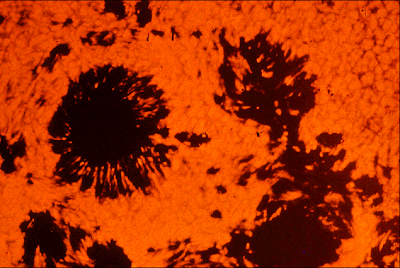 Solar scientists are beginning to come out of the closet as skeptics about human-caused global warming. From “It’s the Sun, Stupid,” by Lawrence Solomon in Canada’s National Post:
Solar scientists are beginning to come out of the closet as skeptics about human-caused global warming. From “It’s the Sun, Stupid,” by Lawrence Solomon in Canada’s National Post:
Four years ago, when I first started profiling scientists who were global warming skeptics, I soon learned two things: Solar scientists were overwhelmingly skeptical that humans caused climate change and, overwhelmingly, they were reluctant to go public with their views. Often, they refused to be quoted at all, saying they feared for their funding, or they feared other recriminations from climate scientists in the doomsayer camp. When the skeptics agreed to be quoted at all, they often hedged their statements, to give themselves wiggle room if accused of being a global warming denier. Scant few were outspoken about their skepticism.
Earlier this month, the link between solar activity and climate made headlines throughout Europe after space scientists from the U.K., Germany and South Korea linked the recent paucity of sunspots to the cold weather that Europe has been experiencing. This period of spotlessness, the scientists predicted in a study published in Environmental Research Letters, could augur a repeat of winters comparable to those of the Little Ice Age in the 1600s, during which the Sun was often free of sunspots. By comparing temperatures in Europe since 1659 to highs and lows in solar activity in the same years, the scientists discovered that low solar activity generally corresponded to cold winters. Could this centuries-long link between the Sun and Earth’s climate have been a matter of chance? “There is less than a 1% probability that the result was obtained by chance,” asserts Mike Lockwood of the University of Reading in the U.K., the study’s lead author.
Solar scientists widely consider the link between the Sun and Earth’s climate incontrovertible. When bodies such the IPCC dismiss solar science’s contribution to understanding Earth’s climate out of hand, solar scientists no longer sit on their hands. Danish scientist Henrik Svensmark of the Danish National Space Institute stated that the IPCC was “probably totally wrong” to dismiss the significance of the sun, which in 2009 would likely have the most spotless days in a century. As for claims from the IPCC and other global warming doomsayers who argue that periods of extreme heat or cold were regional in scope, not global, Svensmark cites the Medieval Warm Period, a prosperous period of very high solar activity around the year 1000: “It was a time when frosts in May were almost unknown — a matter of great importance for a good harvest. Vikings settled in Greenland and explored the coast of North America. On the whole it was a good time. For example, China’s population doubled in this period.”
You have a decision to make: double or nothing.
For this week only, a generous supporter has offered to fully match all new and increased donations to First Things up to $60,000.
In other words, your gift of $50 unlocks $100 for First Things, your gift of $100 unlocks $200, and so on, up to a total of $120,000. But if you don’t give, nothing.
So what will it be, dear reader: double, or nothing?
Make your year-end gift go twice as far for First Things by giving now.


